中考英语总复习 专题九 非谓语动词(语法专项突破+系统梳理+提升演练)(含解析) 人教新目标版
- 格式:doc
- 大小:2.82 MB
- 文档页数:5
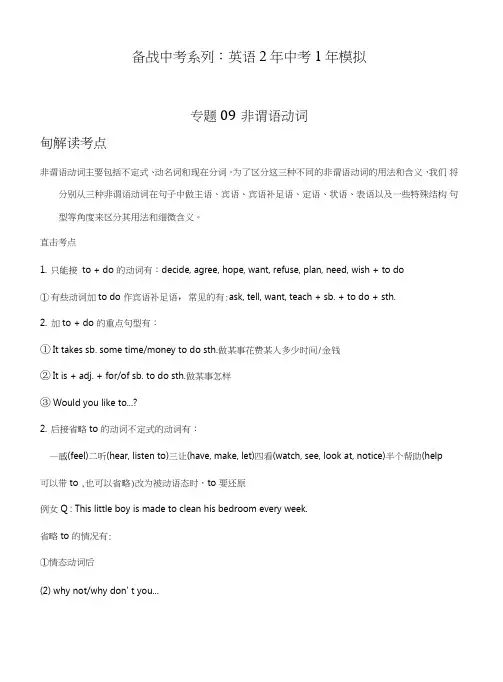
备战中考系列:英语2年中考1年模拟专题09非谓语动词甸解读考点非谓语动词主要包括不定式、动名词和现在分词。
为了区分这三种不同的非谓语动词的用法和含义,我们将分别从三种非谓语动词在句子中做主语、宾语、宾语补足语、定语、状语、表语以及一些特殊结构句型等角度来区分其用法和细微含义。
直击考点1.只能接to + do 的动词有:decide, agree, hope, want, refuse, plan, need, wish + to do①有些动词加to do作宾语补足语,常见的有:ask, tell, want, teach + sb. + to do + sth.2.加to + do的重点句型有:①It takes sb. some time/money to do sth.做某事花费某人多少时间/金钱②It is + adj. + for/of sb. to do sth.做某事怎样③Would you like to...?2.后接省略to的动词不定式的动词有:—感(feel)二听(hear, listen to)三让(have, make, let)四看(watch, see, look at, notice)半个帮助(help可以带to ,也可以省略)改为被动语态时,to要还原例女Q : This little boy is made to clean his bedroom every week.省略to的情况有:①情态动词后(2) why not/why don' t you...3.加doing 做非谓语的动词常考的有: enjoy , finish , mind , suggest, miss , admit, deny, keep, imagine , practice + doing sth.加doing的情况有:⑴介词后+ doing 例如:give up doing sth., be interested in doing sth.等(2) ........................................................................................................................................... f eel like + doing (喜欢做某事)/ prefer doing sth. to doing sth.(更喜欢........................ )(3)to 作介词时的几个常用短语: look forward to/be used to/ pay attention to + doing既可加to do也可以加doing ,并意思相近的动词有:begin , start, like, love, hate既可加to do也可以加doing,但意思不同的动词有:forget to do忘记去1故某事(事情还没有做)forget doing忘记做过某事(事情已经做了,但是忘了)remember to do记得去做某事(事情还没有做)remember doing记得做过某事(事情已经做了)regret to do (对将要做的事)遗憾regret doing (对已经做过的事)遗憾stop to do停下来去做某事(去做另外一件事情)stop doing停止做某事(停止正在做的事情)【名师点睛】动词不定式在句中的作用1.不定式和动名词作主语的区别(1)动名词作主语通常表示抽象动作;而不定式作主语表示具体动作。
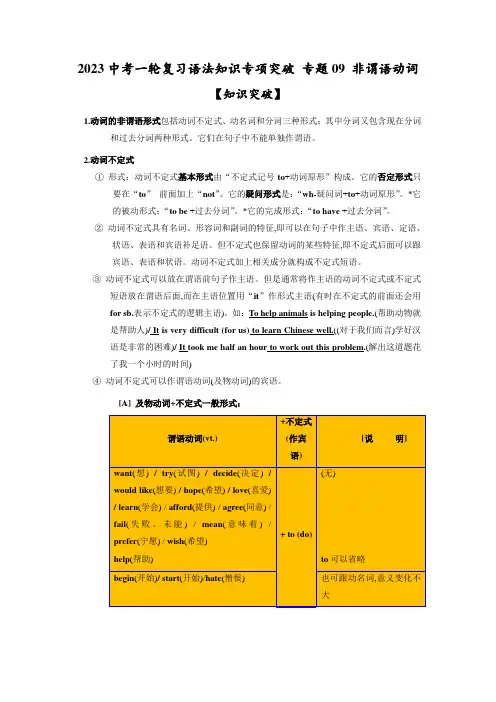
2023中考一轮复习语法知识专项突破专题09 非谓语动词【知识突破】1.动词的非谓语形式包括动词不定式、动名词和分词三种形式;其中分词又包含现在分词和过去分词两种形式。
它们在句子中不能单独作谓语。
2.动词不定式①形式:动词不定式基本形式由“不定式记号to+动词原形”构成。
它的否定形式只要在“to”前面加上“not”。
它的疑问形式是:“wh-疑问词+to+动词原形”。
*它的被动形式:“to be +过去分词”。
*它的完成形式:“to have +过去分词”。
②动词不定式具有名词、形容词和副词的特征,即可以在句子中作主语、宾语、定语、状语、表语和宾语补足语。
但不定式也保留动词的某些特征,即不定式后面可以跟宾语、表语和状语。
动词不定式加上相关成分就构成不定式短语。
③动词不定式可以放在谓语前句子作主语。
但是通常将作主语的动词不定式或不定式短语放在谓语后面,而在主语位置用“it”作形式主语(有时在不定式的前面还会用for sb.表示不定式的逻辑主语)。
如:To help animals is helping people.(帮助动物就是帮助人)/ It is very difficult (for us) to learn Chinese well.((对于我们而言)学好汉语是非常的困难)/ It took me half an hour to work out this problem.(解出这道题花了我一个小时的时间)④动词不定式可以作谓语动词(及物动词)的宾语。
[A] 及物动词+不定式一般形式:I would like to have a rest at the moment./ They began tosearch the room for the thief.(他们开始在屋子里搜寻小偷)/ He liked to have a swim in the pool near his house.(他喜爱在靠家的水塘里面游泳)/ When did you learn to speak English?(你什么时候开始学英语的?)/ Don’t forget to close the door when you leave.(你离开时别忘了关门[比较] He forgot to turn off the light.(他忘了关灯.) (没关)/ He forgot turning off the light.(他忘记关过灯.)(关了) /Please remember to ring me up.(记得给我打电话.)(还没打电话) / I remember calling you yesterday but you forgot.(我记得昨天给你打电话了,但是你忘记了.)(打过电话)[B] 及物动词+疑问词+不定式:He does not know which one to take./ Tell me how to get to the station.(告诉我怎么样去火车站)/ She asked me what to do for today’s homework.(她问我今天家庭作业做什么)/ Can you teach me how to search the internet?(你能教我怎样上网吗?)[C] 不定式作宾语而后面又有宾语补足语时,通常用it代替作形式宾语,而不定式则后置。
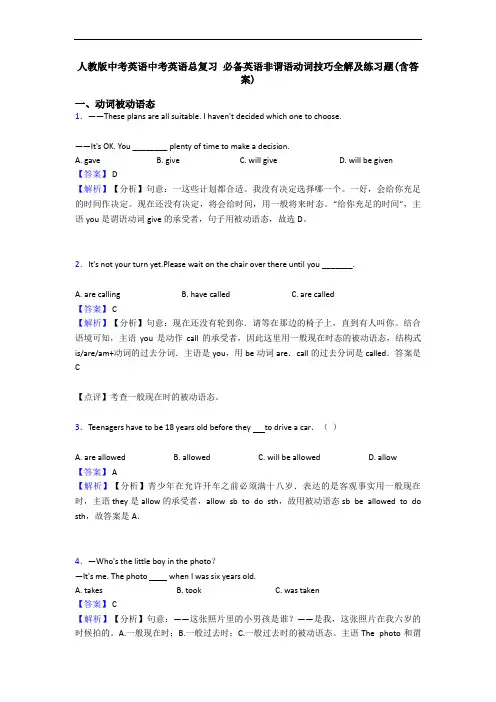
人教版中考英语中考英语总复习必备英语非谓语动词技巧全解及练习题(含答案)一、动词被动语态1.——These plans are all suitable. I haven't decided which one to choose.——It's OK. You ________ plenty of time to make a decision.A. gaveB. giveC. will giveD. will be given【答案】 D【解析】【分析】句意:一这些计划都合适。
我没有决定选择哪一个。
一好,会给你充足的时间作决定。
现在还没有决定,将会给时间,用一般将来时态。
“给你充足的时间”,主语you是谓语动词give的承受者,句子用被动语态,故选D。
2.It's not your turn yet.Please wait on the chair over there until you _______.A. are callingB. have calledC. are called【答案】 C【解析】【分析】句意:现在还没有轮到你.请等在那边的椅子上,直到有人叫你。
结合语境可知,主语you是动作call的承受者,因此这里用一般现在时态的被动语态,结构式is/are/am+动词的过去分词.主语是you,用be动词are.call的过去分词是called.答案是C【点评】考查一般现在时的被动语态。
3.Teenagers have to be 18 years old before they to drive a car.()A. are allowedB. allowedC. will be allowedD. allow【答案】 A【解析】【分析】青少年在允许开车之前必须满十八岁.表达的是客观事实用一般现在时,主语they是allow的承受者,allow sb to do sth,故用被动语态sb be allowed to do sth,故答案是A.4.—Who's the little boy in the photo?—It's me. The photo when I was six years old.A. takesB. tookC. was taken【答案】 C【解析】【分析】句意:——这张照片里的小男孩是谁?——是我,这张照片在我六岁的时候拍的。
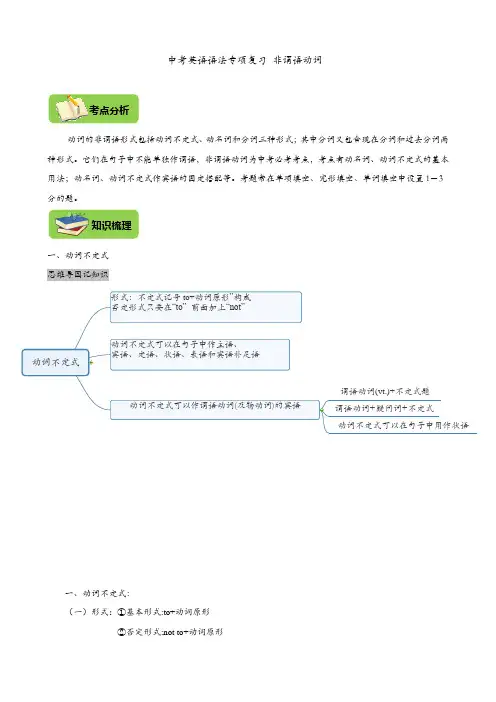
中考英语语法专项复习 非谓语动词动词的非谓语形式包括动词不定式、动名词和分词三种形式;其中分词又包含现在分词和过去分词两种形式。
它们在句子中不能单独作谓语,非谓语动词为中考必考考点,考点有动名词、动词不定式的基本用法;动名词、动词不定式作宾语的固定搭配等。
考题常在单项填空、完形填空、单词填空中设置1-3分的题。
一、动词不定式 思维导图记知识一、动词不定式:(一)形式:①基本形式:to+动词原形 ②否定形式:not to+动词原形知识梳理 考点分析动词不定式形式:不定式记号to+动词原形”构成 否定形式只要在“to” 前面加上“not”动词不定式可以在句子中作主语、 宾语、定语、状语、表语和宾语补足语动词不定式可以作谓语动词(及物动词)的宾语谓语动词(vt.)+不定式题谓语动词+疑问词+不定式 动词不定式可以在句子中用作状语(二)动词不定式的句法功能1.不定式作主语动词不定式作主语时,常用it作形式主语,而将真正的主语放在句末,常用结构为:It +be+adj+(for/of sb.)+to do sth.To learn English well is useful.=It is useful to learn English well.It's important for us to protect the environment.备注:在kind/good/nice/clever等表示人的品质的形容词后,不用for而用of.如:It's very kind of you to help me.你帮助我真是太好啦.It's very clever of you to do like that.你那样做真是太聪明啦.2.不定式作宾语①一些谓语动词后能用不定式作宾语,常见的这类词是表示命令,打算或希望的,如:would like,want,wish,hope,decide,plan,expect等.如:Would you like to see a film this evening?②在find,think后跟不定式作宾语时,常用it代替,而将真正的宾语放在后面.如;I find it easy to read English every day.3.不定式作宾语补足语Lucy asked him to turn down the radio.tell,ask,want,allow,get,would like,encourage后常跟动词不定式作宾语补足语.如:My mother encourage me to learn Japanese.备注:还有一些使役动词和感官动词也用不定式作宾补。
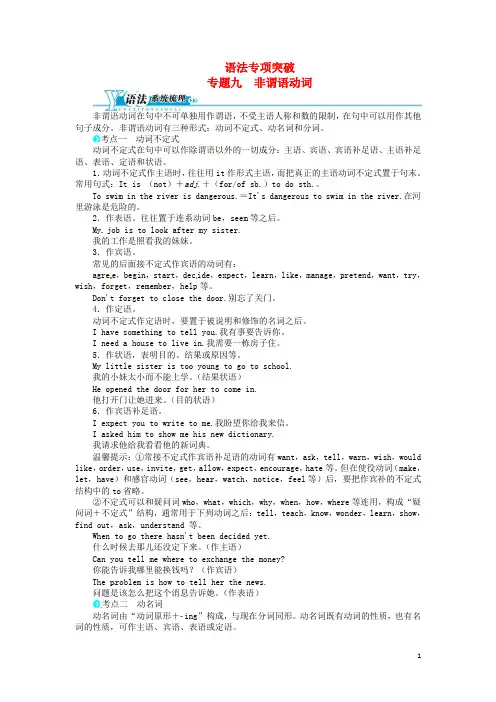
语法专项突破专题九非谓语动词非谓语动词在句中不可单独用作谓语,不受主语人称和数的限制,在句中可以用作其他句子成分。
非谓语动词有三种形式:动词不定式、动名词和分词。
考点一动词不定式动词不定式在句中可以作除谓语以外的一切成分:主语、宾语、宾语补足语、主语补足语、表语、定语和状语。
1.动词不定式作主语时,往往用it作形式主语,而把真正的主语动词不定式置于句末。
常用句式:It is (not)+adj.+(for/of sb.)to do sth.。
To swim in the river is dangerous.=It's dangerous to swim in the river.在河里游泳是危险的。
2.作表语。
往往置于连系动词be,seem等之后。
My job is to look after my sister.我的工作是照看我的妹妹。
3.作宾语。
常见的后面接不定式作宾语的动词有:agre e,begin,start,dec ide,expect,learn,like,manage,pretend,want,try,wish,forget,remember,help等。
Don't forget to close the door.别忘了关门。
4.作定语。
动词不定式作定语时,要置于被说明和修饰的名词之后。
I have something to tell you.我有事要告诉你。
I need a house to live in.我需要一栋房子住。
5.作状语,表明目的、结果或原因等。
My little sister is too young to go to school.我的小妹太小而不能上学。
(结果状语)He opened the door for her to come in.他打开门让她进来。
(目的状语)6.作宾语补足语。
I expect you to write to me.我盼望你给我来信。
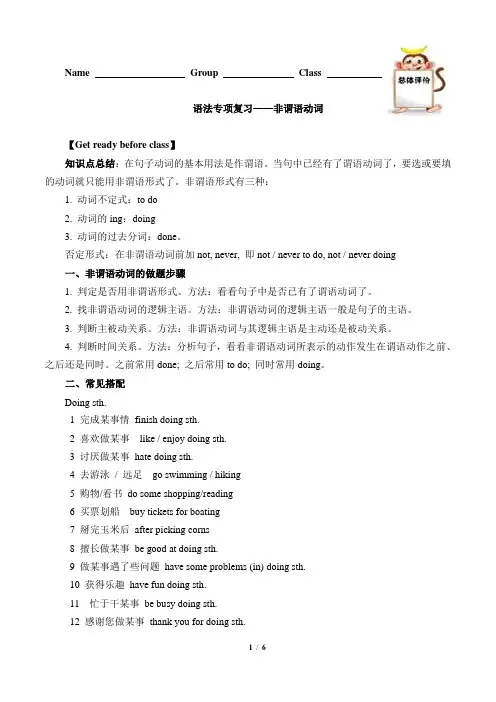
Name Group Class语法专项复习——非谓语动词【Get ready before class】知识点总结:在句子动词的基本用法是作谓语。
当句中已经有了谓语动词了,要选或要填的动词就只能用非谓语形式了。
非谓语形式有三种:1. 动词不定式:to do2. 动词的ing:doing3. 动词的过去分词:done。
否定形式:在非谓语动词前加not, never, 即not / never to do, not / never doing一、非谓语动词的做题步骤1. 判定是否用非谓语形式。
方法:看看句子中是否已有了谓语动词了。
2. 找非谓语动词的逻辑主语。
方法:非谓语动词的逻辑主语一般是句子的主语。
3. 判断主被动关系。
方法:非谓语动词与其逻辑主语是主动还是被动关系。
4. 判断时间关系。
方法:分析句子,看看非谓语动词所表示的动作发生在谓语动作之前、之后还是同时。
之前常用done; 之后常用to do; 同时常用doing。
二、常见搭配Doing sth.1 完成某事情finish doing sth.2 喜欢做某事like / enjoy doing sth.3 讨厌做某事hate doing sth.4 去游泳/ 远足go swimming / hiking5 购物/看书do some shopping/reading6 买票划船buy tickets for boating7 掰完玉米后after picking corns8 擅长做某事be good at doing sth.9 做某事遇了些问题have some problems (in) doing sth.10 获得乐趣have fun doing sth.11 忙于干某事be busy doing sth.12 感谢您做某事thank you for doing sth.13 做某事怎样?What /How about doing sth.?14 跑步有益健康。
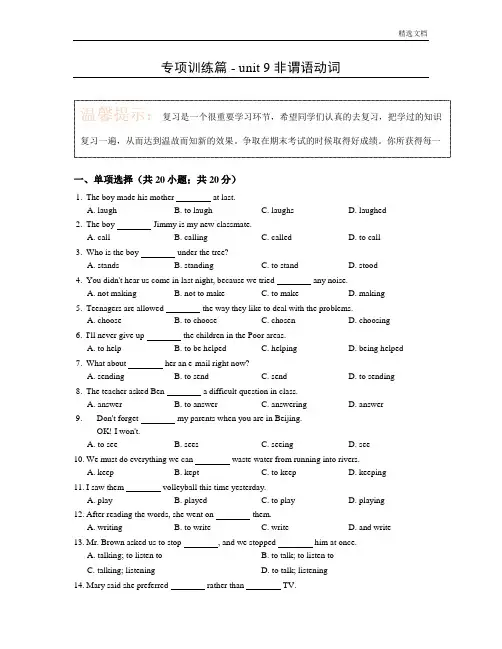
专项训练篇 - unit 9 非谓语动词一、单项选择(共20小题;共20分)1. The boy made his mother at last.A. laughB. to laughC. laughsD. laughed2. The boy Jimmy is my new classmate.A. callB. callingC. calledD. to call3. Who is the boy under the tree?A. standsB. standingC. to standD. stood4. You didn't hear us come in last night, because we tried any noise.A. not makingB. not to makeC. to makeD. making5. Teenagers are allowed the way they like to deal with the problems.A. chooseB. to chooseC. chosenD. choosing6. I'll never give up the children in the Poor areas.A. to helpB. to be helpedC. helpingD. being helped7. What about her an e-mail right now?A. sendingB. to sendC. sendD. to sending8. The teacher asked Ben a difficult question in class.A. answerB. to answerC. answeringD. answer9. --- Don't forget my parents when you are in Beijing.--- OK! I won't.A. to seeB. seesC. seeingD. see10. We must do everything we can waste water from running into rivers.A. keepB. keptC. to keepD. keeping11. I saw them volleyball this time yesterday.A. playB. playedC. to playD. playing12. After reading the words, she went on them.A. writingB. to writeC. writeD. and write13. Mr. Brown asked us to stop , and we stopped him at once.A. talking; to listen toB. to talk; to listen toC. talking; listeningD. to talk; listening14. Mary said she preferred rather than TV.A. to swim; watchingB. swimming; watchingC. to swim; watchD. swimming; watch15. --- Would you mind soccer ball here?--- Sorry. We'll go and play on the playground.A. playingB. not playingC. not to playD. not play16. My roommate often asks me her to play chess.A. teachB. teachingC. to teachD. taught17. Please don't forget the room while I am away in Beijing.A. cleanB. to cleanC. cleanedD. cleaning18. --- Have you made up your mind the sick kids?--- By singing songs.A. what to tellB. how to cheer upC. when to helpD. where to look after19. A mobile phone of this type costs too much at present. You'd better .A. waitB. waitingC. waitedD. to wait20. Frank's mother told him too much sugar because it is bad for his teeth.A. to eatB. not to eatC. eatD. not eat二、适当形式填空(单句适当形式)(共20小题;共20分)21. He didn't finish (read) the book until last week.22. His sister decided (not write) to him again23. They will go to the station (meet) the guests.24. Sorry, I forgot (return) your CD today. I'll give it to you tomorrow.25. Mary is heard (sing) English songs every morning.26. There must be something wrong with my TV set. I'll have it (repair).27. Noodles are my favorite. But I don't like (eat) them when I feel sick.28. Mr. King is usually seen (go) shopping with his wife.29. The broken bike needs (repair) at once.30. He promised (send) me the bill as soon as possible.31. She couldn't help (smile) at the words.32. Would you mind my (open) the windows?33. It's no use (ask) him about it.34. The boy kept (wait) outside the hole for about ten minutes.35. Every morning my grandpa spends half an hour (water) the flowers.36. We're so much looking forward to (see) you again.37. I can read many books every month, and I think most of them are worth (read).38. This problem is a bit hard. Let me (think)it over.39. Who can make the child (stop) crying?40. Did you have your homework (finish)?三、翻译(根据中文提示完成句子)(共10小题;共10分)41. She didn't know (选择哪一件外套).42. How can you the baby (使…停止哭)? (词数不限)43. He has no house (居住).44. The question is (下一步做什么).45. You'd better not read a passage by (翻译) every word into Chinese.46. It's good (帮助) others when they are in trouble.47. Have you got anything (要说) at the meeting?48. She is (够上学的年龄) to school.49. He went to school without (吃) breakfast.50. I'm trying to give up (吸烟).四、按要求转换句型(共5小题;共10分)51. She went to the station. She wanted to meet her aunt. (合并成一个句子)52. His teacher has gone to Beijing. he was to see an old friend. (合并成一个句子)53. We will go to the factory. We want to help the workers. (合并成一个句子)54. The boys went to the lake. They wanted to have a swim. (合并成一个句子)55. The old man is strong. He can carry the heavy box. (合并成一个句子)五、选词填空(短文选词填空)(共5小题;共5分)The train I 56. on was already half an hour late. I had to arrive in Vienna at 7:20 in time 57. the 7:30 train to Paris, but there was no hope of that now. I told the conductor about it. He advised me 58. off two stops before Vienna station and take a taxi. And a few minutes later, I found a taxi in the center of the city. I took hold of my bags quickly and hurried inside. "Paris train" was all I had time 59. to the driver. You can guess how I felt when he 60. to the train that was just moving out of the station.六、适当形式填空(短文适当形式)(共10小题;共10分)For a long time, I dreamed of (do) something in western China and last year I finally became a volunteer teacher. It has changed my life a lot!I travelled a long way to a small village school in Songtao, Guizhou Province. On my way there, I thought about the village, the school, the first day, and the children there. However, my heart went down after (arrive) there. It wasn't what I expected. It didn't look like a school at all! Theschool had only three rooms, one for Grades 1, and another for Grades 2.There was a third room for me.The children welcomed me warmly on my first day. They asked me (tell) them stories about myself and my life in Beijing. The next day, I gave them a test (find) out their level. To my surprise, over half of the students failed the test, but they all wanted (learn) new things. I knew they needed me.I spent many nights (prepare) lessons, reading test papers, and marking homework. I enjoyed (teach) the lovely and hard-working children, and I could see that they were making progress with my help. I have also learned a lot from them. I understand their lives better, and we are now good friends.I have worked in Songtao for a year now. I'm very happy, and the experience has been very useful for me. Now I'm more responsible, and I know how (look) after myself. I love the small village and the children. In fact, I would like (keep) (work) here.答案一、单项选择1. A2. C3. B4. B5. B6. C7. A8. B9. A 10. C11. D 12. B 13. A 14. C 15. B16. C 17. B 18. B 19. A 20. B二、适当形式填空(单句适当形式)21. reading22. not to write23. to meet24. to return25. to sing26. repaired27. to eat28. to go29. repairing/to be repaired30. to send31. smiling32. opening33. asking34. waiting35. watering36. seeing38. think39. stop40. finished三、翻译(根据中文提示完成句子)41. which coat to choose42. make; stop crying43. to live in44. what to do next45. translating46. to help47. to say48. old enough to go49. having/eating50. smoking四、按要求转换句型51. She went to the station to meet her aunt.52. His teacher has gone to Beijing to see an old friend.53. We will go to the factory to help the workers.54. The boys went to the lake to have a swim.55. The old man is strong enough to carry the heavy box.五、选词填空(短文选词填空)56. was travelling57. to catch58. to get59. to say60. pointed六、适当形式填空(短文适当形式)61. doing62. arriving63. to tell64. to find65. to learn66. preparing67. teaching69. to keep70. working文档说明专注于精品小学试卷教案合同协议施工组织设计、期中、期末等测试文档解放你双手,时间就是生命,工作之外我们应该拥有更多享受生活的时间,本文档目的是为了节省读者的工作时间,提高读者的工作效率,读者可以放心下载文档进行编辑使用.(可以删除)由于文档太多,审核有可能疏忽,如果有错误或侵权,请联系本店马上删除。

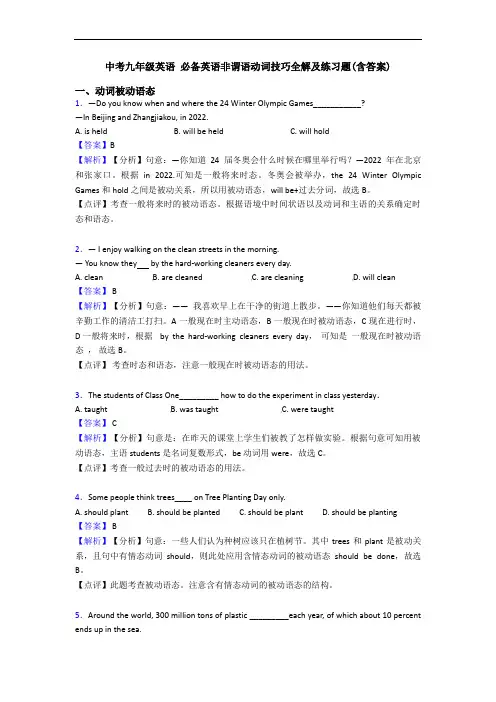
中考九年级英语必备英语非谓语动词技巧全解及练习题(含答案)一、动词被动语态1.—Do you know when and where the 24 Winter Olympic Games___________?—In Beijing and Zhangjiakou, in 2022.A. is heldB. will be heldC. will hold【答案】B【解析】【分析】句意:—你知道24届冬奥会什么时候在哪里举行吗?—2022年在北京和张家口。
根据in 2022.可知是一般将来时态。
冬奥会被举办,the 24 Winter Olympic Games和hold之间是被动关系,所以用被动语态,will be+过去分词,故选B。
【点评】考查一般将来时的被动语态。
根据语境中时间状语以及动词和主语的关系确定时态和语态。
2.— I enjoy walking on the clean streets in the morning.— You know they by the hard-working cleaners every day.A. cleanB. are cleanedC. are cleaningD. will clean【答案】 B【解析】【分析】句意:——我喜欢早上在干净的街道上散步。
——你知道他们每天都被辛勤工作的清洁工打扫。
A一般现在时主动语态,B一般现在时被动语态,C现在进行时,D一般将来时,根据by the hard-working cleaners every day,可知是一般现在时被动语态,故选B。
【点评】考查时态和语态,注意一般现在时被动语态的用法。
3.The students of Class One_________ how to do the experiment in class yesterday.A. taughtB. was taughtC. were taught【答案】 C【解析】【分析】句意是:在昨天的课堂上学生们被教了怎样做实验。


(怀化专版)2017年中考英语命题研究第二编语法专题突破篇专题九非谓语动词(精讲)试题编辑整理:尊敬的读者朋友们:这里是精品文档编辑中心,本文档内容是由我和我的同事精心编辑整理后发布的,发布之前我们对文中内容进行仔细校对,但是难免会有疏漏的地方,但是任然希望((怀化专版)2017年中考英语命题研究第二编语法专题突破篇专题九非谓语动词(精讲)试题)的内容能够给您的工作和学习带来便利。
同时也真诚的希望收到您的建议和反馈,这将是我们进步的源泉,前进的动力。
本文可编辑可修改,如果觉得对您有帮助请收藏以便随时查阅,最后祝您生活愉快业绩进步,以下为(怀化专版)2017年中考英语命题研究第二编语法专题突破篇专题九非谓语动词(精讲)试题的全部内容。
专题九非谓语动词,怀化五年中考命题规律及趋势考纲要求动词不定式做宾语、宾语补足语、目的状语、动名词作宾语考查点年份题号选项设置分值动名词作宾语201563enjoy 学习→enjoy__________1分作宾语(固定搭配)201365want to berich and______(买) abig house1分201228turn/toturn/turning1分不定式作主语201564it's not easyfor me to______friends1分怀化中考对非谓语动词的考查不多,仅限于动词不定式作宾语的情况,主要考查动词不定式作宾语的一些固定搭配,如:want to do sth./remember/forget to do sth。
等,并且近两年很少考查非谓语动词。
但在2015年短文填词中又考查了enjoy doing sth.和动词不定式作主语的情况,也就是固定句型It’s+adj。
+for sb.+to do sth。
预计2017年怀化中考很有可能在单项选择中考查一道动词不定式作宾语的题。
,怀化中考重难点突破【满分点拨】1.非谓语动词的定义及句法功能(1)非谓语动词的定义非谓语动词是在句子中充当除谓语以外的句子成分的动词形式。
语法专项突破专题九非谓语动词非谓语动词在句中不可单独用作谓语,不受主语人称和数的限制,在句中可以用作其他句子成分。
非谓语动词有三种形式:动词不定式、动名词和分词。
考点一动词不定式动词不定式在句中可以作除谓语以外的一切成分:主语、宾语、宾语补足语、主语补足语、表语、定语和状语。
1.动词不定式作主语时,往往用it作形式主语,而把真正的主语动词不定式置于句末。
常用句式:It is (not)+adj.+(for/of sb.)to do sth.。
To swim in the river is dangerous.=It's dangerous to swim in the river.在河里游泳是危险的。
2.作表语。
往往置于连系动词be,seem等之后。
My job is to look after my sister.我的工作是照看我的妹妹。
3.作宾语。
常见的后面接不定式作宾语的动词有:agre e,begin,start,dec ide,expect,learn,like,manage,pretend,want,try,wish,forget,remember,help等。
Don't forget to close the door.别忘了关门。
4.作定语。
动词不定式作定语时,要置于被说明和修饰的名词之后。
I have something to tell you.我有事要告诉你。
I need a house to live in.我需要一栋房子住。
5.作状语,表明目的、结果或原因等。
My little sister is too young to go to school.我的小妹太小而不能上学。
(结果状语)He opened the door for her to come in.他打开门让她进来。
(目的状语)6.作宾语补足语。
I expect you to write to me.我盼望你给我来信。
I asked him to show me his new dictionary.我请求他给我看看他的新词典。
温馨提示:①常接不定式作宾语补足语的动词有want,ask,tell,warn,wish,would like,order,use,invite,get,allow,expect,encourage,hate等。
但在使役动词(make,let,have)和感官动词(see,hear,watch,notice,feel等)后,要把作宾补的不定式结构中的to省略。
②不定式可以和疑问词who,what,which,why,when,how,where等连用,构成“疑问词+不定式”结构,通常用于下列动词之后:tell,teach,know,wonder,learn,show,find out,ask,understand 等。
When to go there hasn't been decided yet.什么时候去那儿还没定下来。
(作主语)Can you tell me where to exchange the money?你能告诉我哪里能换钱吗?(作宾语)The problem is how to tell her the news.问题是该怎么把这个消息告诉她。
(作表语)考点二动名词动名词由“动词原形+ing”构成,与现在分词同形。
动名词既有动词的性质,也有名词的性质,可作主语、宾语、表语或定语。
1.作主语Eating too much junk food is bad for our he alth.吃太多垃圾食品对我们的身体健康有害。
温馨提示:动名词和动词不定式作主语,在许多情况下可以通用,但动名词作主语多表示抽象或多次的行为,不定式作主语往往表示具体的或一次性的动作。
2.作表语My mother's job is cooking.我母亲的工作是做饭。
3.作宾语I don't mind listening to that story aga in.我不介意再听一遍那个故事。
温馨提示:其后常接动名词的动词及动词词组有finish,enjoy,practice,mind,keep,consider,miss,avoid(避免),suggest,admit,be worth,have fun(in)/have difficulty (in)/problem(in)/trouble(in),waste time(in),can't help等。
4.作定语,表明它所修饰的词的用途Let's join the singing group.让我们加入合唱队吧。
a working method 工作方法5.其后既可以接动名词,也可接动词不定式的动词有 love,like,prefer,begin,start,continue,remember,try,stop,forget,hate,go on等。
考点三分词分词分为现在分词和过去分词。
1.区别:(1)现在分词表示主动,过去分词表示被动。
The man standing by the window is our teacher.站在窗边的人是我们的老师。
The building built last year has become our lab.去年建的楼已成了我们的实验室。
(2)现在分词表示事物本身所具有的性质,意为“令人……的”;过去分词表达由外界引起的内心活动,意为“感到……的”。
the exciting news令人兴奋的消息the excited look激动的表情常用的还有:interesting/interested,tiring/tired,boring/bored,surprising/surprised,amazing/amazed。
(3)现在分词表示正在进行的动作,过去分词表示完成的动作。
2.用法:(1)作定语:单个分词作定语一般放在所修饰的词的前面,短语作定语常放在所修饰的词的后面。
The question being discussed is important to us.正在被讨论的问题对我们很重要。
The excited people rushed into the building.激动的人们冲入了大楼。
(2)作状语:分词或分词短语可以作时间、原因、方式、结果、伴随等状语。
Being a student,I must study hard.作为一名学生,我必须努力学习。
(原因状语)He ran out of the room,crying loudly.他大声哭着从房间里跑出来。
(伴随状语)(3)作表语。
The movie is interesting.这部电影很有趣。
The door is broken.门破了。
(4)作宾语补足语,一般用在see,hear,notice,feel,have等动词之后与宾语构成复合宾语。
I saw a cat running a cross the street.我看见一只猫跑过街道。
I must have the bike repaired.我必须找人修修自行车。
温馨提示:不定式与分词都可跟在某些动词之后作宾语补足语。
不定式作宾语补足语,表示动作发生的全过程;现在分词作宾语补足语,强调动作正在发生;过去分词作宾语补足语,侧重于表示被动的概念。
When they went into the school,they saw some boys playing football.当他们走进校园时,他们看见一些男孩在踢足球。
(正在做)Do you often see them play basketball?你常看他们打篮球吗?(全过程)He spoke loudly to make himself heard clearly.他大声说以便让别人听清他的话。
(他的话被听)1.(2012湖南怀化中考,28)Remember______off the lights when you leave the classroom.A.turn B.to turn C.turning2.(2012湖南永州中考,27)Please tell me ______ next.A.how to do it B.what to do it C.how do it3.(2012福建宁德中考,37)Please tell the students______ quiet in class.A.keep B.keeping C.to keep4.(2012湖南衡阳中考,26)Try to sing more English songs,and you will find it interesting ______ a foreign language.A.learning B.learns C.to learn5.(2012 湖南湘潭中考,24)It is polite ______ a gift when you visit somebody for the first time.A.take B.taking C.to take6.(2012四川成都中考,37)Parents often ask their kids ______ their internet friends because the kids may be in danger.A.to meet B.not to meet C.meeting7.(2012黑龙江齐齐哈尔中考,33)Lisa is a little poor at Chinese.I think she needs ______it every day.A.practice to speak B.to practice speaking C.practice speaking8.The house is too small for his family ______.A.to live in B.living in C.live in9.Fang Fang is old enough______to school.A.goes B.to go C.went10.Lucy kept me______for over twenty minutes.A.to wait B.waiting C.waited11.The boy______in the teacher's office was found______yesterday.A.standing;smoke B.standing;smoking C.stood;smoke 12.—Where's Mr Yang,do you know?—Well,it's hard to say.But I saw him ______ a football game just now.A.was watching B.watching C.had watched13.John was made______the truck for a week as a punishment.A.wash B.washing C.to wash14.The old man didn't know ______ when the house caught fire.A.what to do B.how to do C.what to do it15.—How do you feel when you watch the national flag go up?—It makes me ______ very proud.A.felt B.to feel C.feel16.People spent two hours ______ the fire.A.to put off B.putting out C.putting on17.No one knew why the women kept ______ at the party.A.laugh B.to laugh C.laughing18.—Science is so difficult!—I think you should keep on ______ hard.A.study B.to study C.studying19.The old man is ill and he doesn't feel like ______.A.to eat something B.to eat anything C.eating anything 20.—Tom,your hair is too long,and you should have it ______ this weekend. —OK,I will do it this Sunday.A.cutted B.cut C.to cut参考答案专题九非谓语动词专题提升演练1.B remember to do sth.“记得去做某事”。